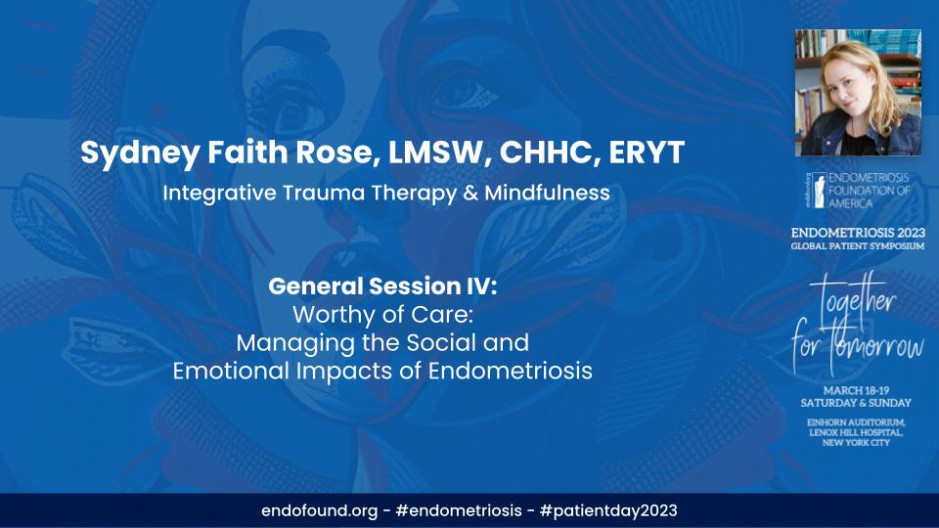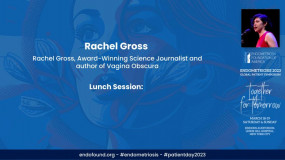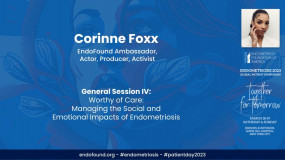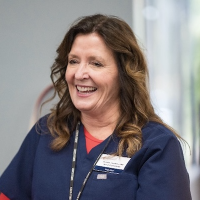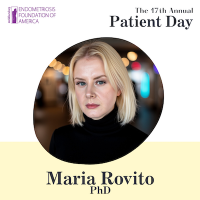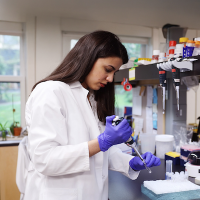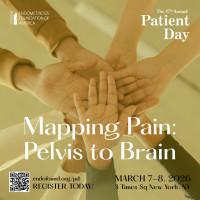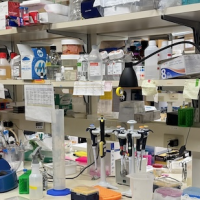Endometriosis 2023:
Global Patient Symposium
Together for Tomorrow
March 18-19, 2023 - Einhorn Auditorium, Lenox Hill Hospital, NYC
Also have some similar lived experiences. So, um, this is our workshop description. I'm gonna talk you through it, but first I just wanna check in and see how everybody's feeling in their bodies. It's kind of a tough question in a room full of innovations, but if there's anything that you are feeling like you need in your body right now, like if you wanna shake it out a little bit or stretch it out, this is an invitation to do that. It's really rare as folks with chronic pain that we get invited to do with our bodies what we need and want to do. So I would love to ask you to listen to your body while I'm talking <laugh>. Um, and my buddy is wanting three deep, full mindful breaths right now. So if you don't mind taking them with me, we can just take a deep inhale and then exhale, make sure that you're breathing all the way out. And do it one more time. Let's do it one more time. And if there's tension anywhere in your body that you're holding,
This is your invitation to like let it out. We are not gonna be able to cover all of the social and emotional impacts of living with endometriosis today in 45 minutes. And I just wanna name that, that, um, this is a really large and important topic and it doesn't get talked about enough. But what we are gonna do is go through some of what's in this workshop description. So even with a good team of doctors struggling with identity and shame is often the norm when it comes to managing chronic pain conditions. And often, especially in specific kinds of ways when those conditions impact women and trans people impacts us all. But with Endo, it has its own gendered components. Sometimes, um, it can feel like an enormous responsibility to accomplish daily life tasks when you're living with chronic pain. I don't have to tell you all that.
A lot of you already know this. And it's easy to forget about pleasure and to feel unfulfilled in life and relationships when you're spending a tremendous amount of your time negotiating for the accommodations that you need at work or trying to figure out how to explain what you're feeling to your doctor. Overwhelming feelings of helplessness, pain during sex and finding ways to move when your body hurts. It can really feel exhausting. And, and so today we're gonna talk about the needs of folks with endometriosis and pelvic pain, and we're gonna talk about how to navigate relationships with partners, friends, care providers, and how to feel more connected and confident living with endo.
Hear me? Oh, can you hear me? Yeah. Um, and we're also gonna talk a little bit about preventing anxiety and depression that often come with chronic pain. We're gonna talk about why those things tend to go together, and we're gonna talk about some of the current wellness literature that covers this in mental health. There's also a great need for more. So just know that this is the beginning of this conversation and if you want to continue to have this conversation, it's something that I love talking about. I'm really passionate about talking about it. So please reach out to me or come talk to me and let's keep it going. So this is me. I've been working in mental health for a really long time, and I've been working both as a peer and a provider. I think that's really important. It informs my work in a particular kind of way. Um, and I'll just tell you a little bit about what I love, which is that for me, my work is rooted in a deep commitment to learning and listening and teaching as much as I can about the way that our brains embodies, respond to stress, both short-term stressors and long-term stressors like living with a chronic condition. And I also really love helping people move out of chronic stress and into joyful, meaningful lives.
This is Becks. Becks is on my team and helped me put together this presentation. Um, they're really amazing. And this is Amanda, who also has helped me in a tremendous amount of ways in my business, more than I could even name. I just wanna thank those people right now because everybody who works with me right now is disabled and we work on our own timeline in a way that works for us. We could not do this by ourselves. I could not put together this presentation by myself, but we are able to do it together. And so I also wanna thank all of the people who indirectly made it possible for me to come here and talk about this. That includes researchers, doctors like Dr. Second that includes disability activists and people who've been thinking and writing about how we talk about living in a body with a disability.
We're gonna talk about that term a little bit, which I know is a loaded term for folks living with Endo for a variety of reasons, right? Both as a legal term and as an identity term. So I would love, as I thank these folks, if we could all do a brief kind of gratitude check-in in this moment. Um, I would love it if you would bring into your mind someone who made it possible for you to be here today. And that could be someone who told you about this conference. It could be, um, your doctor who made it possible for you to get up out of bed. But it could also be anybody who helped you get here, like an Uber driver or, um, somebody who made sure the trains were running so that you didn't have to think about it this morning. So if you could just take like one or two breaths and say thank you to someone who made it possible to be here.
And then I would also love for you to say thank you to yourselves. I think it's really powerful that in New York City on a weekend when you could be almost anywhere doing anything, you're here to talk about your mental and emotional wellbeing. To me, that's like the most amazing group of people I could connect with is people who wanna do that. So this is what we're gonna do. We're gonna talk about key terms. We're gonna talk about managing endo and all the mental health stuff that comes with all the stuff we just talked about today. Talking to doctors, talking to your boss, talking to your partner, maybe talking to lawyers. We know being an end of patient is a full-time job in and of itself. And we're also gonna talk about the connection between pain and stress. We're gonna talk about shame and the idea of disability or ability.
And we're gonna talk about how that relates to what it means to be human, what it means to be a person living in a body that needs help. And we're gonna talk about community and care because as Dr. Second said earlier, we can't manage our mental health by ourselves. We as humans need each other. We're gonna talk more about why that is, um, what it is about us as a species that makes us special in that way. But this really is collective. If we really care about the mental health and emotional health of endo patients, it has to be something that's addressed on a community based systemic level. So these are some key terms. Um, I'm wondering how many of you, but just by a show of hands, recognize the, some of these terms or maybe all of these terms. Okay, that's awesome. A lot of you. So some of these like stress or the mind body connection, have gotten to be more used, more frequently used recently. Some of these, um, like the social model of disability or the window of tolerance, are more like clinical words that we're gonna learn about today.
Um, so the first thing on the agenda is managing endo. It's what we're all talking about here, <laugh>, right? And it is a full-time job. So these are some of the things that we often see associated with endo. They're some of the first words that come to people's minds. Things like pelvic pain, um, painful periods, exhaustion, inflammation, stress. And one of the realities of living with endo, I don't have to tell you all, is the need for ongoing symptom management that, um, we often fail to recognize that it's not just this stuff over here on the right hand side that makes quality of life for folks living with chronic pain so difficult, um, that it's actually managing the process itself. That takes a significant toll on us. So here are some of the things that we don't necessarily talk about that are added burdens in the lives of folks managing endometriosis, things like scheduling appointments and maybe rescheduling appointments if you're in too much pain to get on the subway.
Things like meeting new doctors and writing a timeline of your symptoms and wondering will they even read them? Things like uncertainty about pain, the fear of not knowing. Are you gonna be able to go on that vacation? Are you gonna have to cancel that trip because you're in too much pain to get on the plane? Uncertainty about pleasure. So going into situations like dating, eating sex, that most people tend to assume that they're gonna experience pleasure in folks with endometriosis, we don't know that that's gonna be true. Feeling disempowered and having to like amp yourself up, right? All the energy that it takes to just get yourself into that feeling of I'm ready to confront this prescriptions and refills, loneliness and shame treatments that aren't working. How do I communicate with my doctor about that? How do I communicate effectively? How do I spend enough time checking in with my body that I can track my pain?
How do I find the right words to express it to my doctor? And then how do I also dissociate enough for my pain that I can go into a negotiation with my boss, with all these legal, legal considerations in mind? That is tough. <laugh> endometriosis patients are definitely working. Um, unfamiliarity with body, with your body, not knowing if your pants are gonna fit cuz your endo belly is so bad they feel so uncomfortable. Side effects of medications, vulnerability. We're often put in situations where we're forced to be vulnerable. That can be incredibly stressful. Um, and all this other stuff. <laugh> workplace accommodations, testing in procedures, surgical recovery, finding someone to hang out with your cat while you're in surgery. Finding the energy for relationships. I can't cover it in this slide. It would take all day to discuss all of the things that folks with endometriosis are navigating.
Why does this matter in terms of mental health? Well, one of the reasons it matters is because if you're really tired and nobody around you understands why this might be part of what's happening. Executive functioning skills are the mental processes that enable us to plan, focus, attention. Remember instructions, juggle multiple tasks successfully with endo patients. We are doing a lot of this and our bodies are really set up to respond to threats like an internal threat with pain. We're gonna talk more about that or an external threat like fear. Something that's quick and immediate we're our bodies are really set up to handle threats that are sort of acute and happen quickly and go away. We're not so much set up to be constantly managing pain and anxiety and threats. So the mind body connection, you've probably heard a lot about it. We're not gonna talk too much about it today because there's way too much to say.
Um, but I do think it's cool for y'all to know that we did a meditation this morning. The mind body connection is not just like kind of a fluffy spiritual thing if that's how you feel about things, but, um, our brain and body actually do communicate. They communicate through bioelectrical signals and through biochemical messaging. It's very, very interesting. This, again, is a conversation I love having. So follow up with me if you want more slides on this <laugh>, we're not gonna talk too much about it today, but one other thing that I will say is that we tend to think of our minds as really in control, right? They tell our bodies what to do and our brains are really in control. But actually there are four times as many signals coming from your body to your brain as they're reverse. And so when we're thinking about changing the experience of pain, the lived experience of pain or fear, this is pretty important.
Um, most therapists are unfortunately not trained to think this way. Um, I was not trained to think this way in graduate school. So it's much like other areas of endometriosis and, and chronic stress and chronic pain. These are things that are emerging in the field and there are things that we're still learning about. Um, so there's a lot we don't know about the way the brain and body communicate, but there are some things that we generally can assume about pain and anxiety or pain and fear. Most endo patients or patients with long-term chronic pain will tell me that they also experience significant anxiety symptoms. There are some intuitive reasons why that makes sense, but I also think it's important to think about what pain and fear do for us as humans. They alert us to something that's dangerous. So when your body's in pain, what it's actually telling you is, Hey, there's an internal threat.
We need to pay attention. And the same is true when we're thinking about fear, anxiety. Your body's thinking, oh my god, we have to get away from something really scary. So this is a very simplified version of a graphic that I use with clients. That green part is what we call your window of tolerance. Your window of tolerance is the amount of stimulation that your brain and body can handle without queuing a stress response. And it's gonna be different for on every day. And it's gonna be different depending on how much pain you're in, depending on how many scary experiences you have, depending on how often you're invalidated or have to go into a difficult conversation with your boss or your partner, right? And as you can imagine, if you had just come from the beach, why don't we actually imagine this? Imagine just sitting on the beach in a beautiful place, <laugh>, let's, let's do it.
Or somewhere else where you just don't have to feel worried, right? Somebody's taking care of, somebody's gonna clean your apartment, somebody's taking care of really good care of your kids or your pets or whoever you love. You're just hanging out on the beach. You don't have to do any negotiating today. And on your way home, you get stuck in a traffic jam. That traffic jam might not push you out of your window of tolerance because you're already so calm. But for folks with chronic pain, we are out of our window of tolerance most of the time. <laugh>. Um, and that's an important thing to know just so you can give yourself grace and be loving to yourself that if you are consistently dealing with stressors, if your, if your alarm system in your apartment building was going off 24 hours a day for days or weeks on end, probably be pretty difficult to go into a conversation with your doctor or with your partner in a way that was like really calm and controlled and peaceful.
Um, so if you're struggling with that, it's not your fault. It's just, it's real chronic stress. There's a lot to say about chronic stress. There's a lot to say about it in relationship to inflammation. Um, but I think the most important thing to know is that our bodies get into habits in terms of the ways that we respond and relate to chronic stress and cope with them. Some of those habits are more adaptive than others. Some can help us more than others. But in general, if you're living with chronic pain, you, your body is looking for a way to cope with stress. And if you are looking for help with that therapy, the right therapist, just like the right doctor can be really, can really help stress and inflammation. I'm not gonna talk too much about this, but we do know that stress can increase the people's perceptions and experiences of pain.
And we also know that there is a link between inflammation and mental health conditions, inflammation and trauma. We know that there are links between trauma and endometriosis. Many, and they happen in many intersectional ways. And these are, again, things to come talk to me about after our session, but just know that they're connected. The pain and stress cycle is really important. This is what I wanna talk about today because it's something that I think most folks with endo know on some unconscious level, even if we don't have the language for it. So when you're dealing with pain, when all of a sudden your body starts to hurt, it's often really scary, especially if you're not sure what's gonna happen next. If you're not sure if the pain's gonna get worse, if you're not sure if you're gonna lose your job, if you're not sure if you're gonna be able to have sex with your partner.
And so it makes sense that oftentimes folks respond to pain with fear. Similarly, fear can make us much more sensitive to pain. So breaking that loop is really, really important and it can be so hard to do because one thing that fear is really good at doing is convincing you to pay attention. And same thing with pain. That's what they're there for. Our bodies wanna keep us safe, their number one priority more than us having pleasure, more than us feeling really excited about life more than us having great sex or having an amazing, meaningful job. Your body wants to keep you safe first and foremost. So it wants you to know when there's something that that could put your life in danger. Thank you. Body <laugh>. Unfortunately, we as humans are often so good at this that we get in our own ways, but, uh, really important to have a body that wants to protect you and keep you safe.
Pain and depression. Um, so this goes back to that slide on on inflammation. We know that being in constant pain can be a reason that people become depressed, but it's actually more complicated than that. It may be that folks with higher levels of inflammation in their body are at risk on some level of mental health conditions. And so it's really important, even if you don't feel like mental health is something that's present for you, how could you not? But even if you don't, even if that's not in your realm of thinking, that it might actually be a really good idea to just check in with a mental health professional if you've got an inflammatory condition. We also know that shame surrounding pain, which we're gonna talk about, is really important in terms of how we relate to and respond to pain. And then that mechanism where we have to disconnect from pain on some level to live our daily lives, but also stay connected enough to it that we can communicate with the people who can help us or even save our lives. Uncertainty about if the pain will go away, when it will return. Um, fear of being labeled a drug seeker, fear of the idea that someone will think that we're not working hard enough. We're gonna talk more about some of the, uh, cultural stigmas in society, about being a person who can't do things, who can't function.
So what helps us interact? Interrupt the pain and stress cycle. What help us, helps us feel calm and safe in our bodies. And this is gonna be different for everybody, but here's a list of a couple of things that work for most people. Sometimes moving your body in a way that feels good can help going for a walk or a run or a gentle stretch or a dance. So if you are feeling like you wanna move your body a little bit right now, like sway a little bit, side to side or take a stretch, please feel welcome to do that. You don't have to sit still just cuz we've all been trained to do that. Um, breath work and deep breathing. So let's do that together. Maybe one more time, just take a deep breath in and a full exhale and I'd invite you to do that as much as you want to throughout this weekend.
As much as you can remember to mindfulness, meditation, relaxation, a lot of these things you've probably heard of the cognitive therapies, body-based therapies, connecting with loving people who get it. So being here laughing, finding ways to experience joy or pleasure, cuddling, appreciation of other people, the people around you, creativity, imagination, art, making, and then releasing emotions like screaming into a pillow. <laugh> when you're really frustrated after that. Meeting about accommodations can be really helpful. Um, stomping on the floor, remembering the people you love and value and remembering how important they are to you beyond just what they do and what they accomplish. And connecting with nature, remembering what matters most. So for most of you, if I asked you to think of three things that help your body feel calm and safe, you probably could tell me some things on this list. You probably didn't need me to list them out like that.
Sometimes it's good to just get a reminder, but I bet that some of these things are, are pretty intuitive to you. Um, there are some other ways of using mindfulness to work specifically with pain. We're not gonna go too deep into these, but I'll invite you to try one or two of them right now. So one is to work, uh, with an area that's not in any pain. So if you can find some area of your body right now that feels neutral or feels pleasurable, you can think about directing your attention to that part of your body. And then there are other ways of working with pain directly, getting curious about it, sending compassion to your pain, um, helping your body learn that it doesn't have to be in fear when pain arises. And lastly, expanding your consciousness. Pain has a way of taking up our whole awareness. So just directing your attention to other things like a speaker on stage or the color blue at our feet.
Again, none of these things are particularly unique. We as humans have a lot in common that helps us feel safe. But there's something that I often find that gets in the way of my clients practicing the things that make them feel good. And that is shame around the experience of disability and even the word disability. I know a lot comes up for people when I say this word. So one thing that I wanna start by saying is that pain and illness are natural parts of what it means to be a person. Every single human who lives long enough on this planet is going to be disabled. So this is one of those statuses that really could bring us together. And the most wonderful thing about being a human as opposed to other animals, although some other animals do this too, is that as humans, we don't survive on this planet because we have really sharp claws.
We are very much not gonna win a fight with a bear. Most of us <laugh> and we are also not the fastest. We, um, have a couple of things that we're really, really good at and one of them is collaborating. It's working together. It's getting a bunch of minds like this in a room and finding ways to accomplish things that we couldn't accomplish on our own with the support of each other. Um, and so I wanna ask that for today. We think about the idea of disability as an invitation into deeper intimacy with the people around us. An opportunity for us to give and receive care. So many people find themselves battling intense feelings of shame and helplessness as we navigate chronic illness. And it can be really easy to start to lean hard into all of the ways that we are showing up. And you are.
And I want you to feel gratitude for that. And also, there's nothing wrong with being in pain. It doesn't make you bad. Shame has a powerful impact on humans. It's actually related to our survival. So just like fear and pain, those alarm systems, because as humans we need each other to survive. Feeling like you're gonna be ostracized, fired, broken up with is terrifying <laugh>. It is a threat. It is a social threat because humans are social creatures. So threats to our social environment are threats to our survival. If you feel that way, it's okay. Your body's wanting to keep you safe again. Um, but we also know that feelings of shame can intensify perceived pain. So if you're feeling helpless and ashamed, that can actually make your pain worse. Okay, um, all right, <laugh>, we have five minutes. We're gonna speed through this, um, <laugh>.
So, um, so let's talk about this. So here are some of the moments when endo patients say that we feel the most, um, helpless when things are unpredictable, when we face challenges, a lot of the stuff we've already talked about. But another big point that I wanna make here is when that pain becomes stronger than our mask, then our ability to present as people who are not in pain. So we spend a lot of energy not just managing all these other aspects of endo, but trying to pretend we're not in pain. Here's some of the beliefs that contribute to feelings of shame around illness. Things like, I should have better control of my body. I should be able to function more, toughing it out as morally superior. Um, asking for help is an inconvenience to others. All of these things can make it really difficult to live with.
Endo can make it really lonely to live with. Endo mindsets are the beliefs we have about ourselves and our reality. And so mindset training is the practice of reframing some of these thoughts, some of these deeply held beliefs. This is another really important thing, and if you're taking pictures, I'm gonna move through this stuff kind of quickly, but um, feel free to, I'll follow up with the slides and the slides have all the citations on them and I'm happy to go through them with you. Um, so <laugh>, simply believing stress is harmful can dramatically increase the detrimental impact of stress. So I don't want, you want this to feel like something that's heavy or painful. What I want it to feel like is an opportunity for us together to reframe some of the ways that we think about experiencing chronic pain. And to know that the more that you are actively engaged in a process, hopefully with a therapist or with another supportive person around reframing your thoughts around pain, you have a lot of power, um, to impact your body's ability to heal. I'm just gonna quickly review some of the things we talked about. Start noticing pleasure, becoming mindful of neutral sensations in your body. Learning to work with pain in a more conscious way. Here's some more things that can be helpful. Breath work, movement, humming, chanting, massage, cold exposure. There's a lot of things that we're learning can be really helpful in working with chronic pain, including C B T A C T, mindfulness.
But I really wanna just bring home this idea and it's coded into our language. This is from a recent article, I think it's in the New York Times or the New Yorker, but I just did this on my way to the bathroom. I said, I'm running to the bathroom <laugh>, right? I'm gonna grab a quick bite, jumping in the shower, hopping on this zoom call. Um, you don't have to run. And one of the things I love about being around other people who struggle with chronic pain is that we work on the timeline of our own bodies. The rest of the world could maybe learn some stuff from that. Um, and then the next thing that I wanna say is to just really bring home what Dr. Second said earlier, which is that the mental health of endo patients is tied to the mental health of Endo doctors.
And it's tied to the mental health of Endo therapists. And it's tied to the mental health of folks who live in the hospitals where we're getting our surgeries. <laugh>. It is tied to, um, community mental health as a whole. And so a huge part of the mindset shift that's necessary when we're thinking about mental health is a shift from individual health behaviors, which we know are really helpful. And I wanna encourage you to do, and I'd love to support you in doing it, um, to the recognition that being human and asking for help with some of these things can liberate us. It can be a way that we can release all of that pressure that comes with those beginning slides to outsource some of that, um, executive functioning, some of that appointment making, some of that communicating with all these different people that having a mental health professional on your team or even just a supportive family and community that understands endometriosis can reduce your pain, your stress, your inflammation, and also make your life a lot better.
So, um, there's a lot to say, more to say about things that, um, can be disabling within the context of our systems and about the location of the disability, not within us as individuals, but within the structures that we're trying to engage in. Um, and one of the things that I just will kind of keep saying, again, I'm gonna move through these slides, but again, feel free to ask me for them and talk to me more about them, is, um, that it's okay that this is a community approach. It's not even just okay, it's the only way. It's the right way. It's part of what it means to be human. That, um, disability can be something that actually connects us as people, our need for each other, our need to work together collaboratively and collectively and community, and not something that makes each and every one of us feel ashamed when it inevitably happens in our lives because it does.
Um, and so with that said, I'm really grateful to be in community with y'all and would love to stay in community with you and talk more about some of this stuff, whether you're interested in the individual health behaviors, some of the stuff we described about the brand mind and body connection in shame. I also, um, have been doing a bunch of research recently on chronic illness and eating disorders, something I'm becoming really passionate about. Feel free to reach out to me and or my team. This is how to find us. You can also Google me, um, and I will be here in community with you. Thank you so much.



